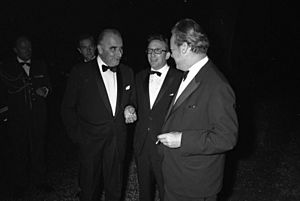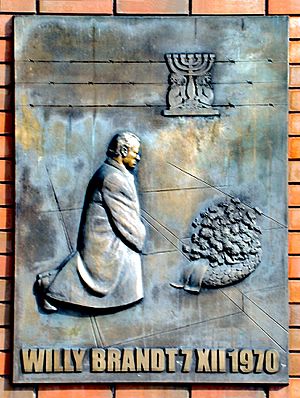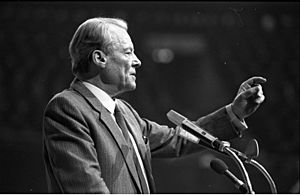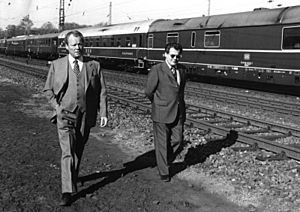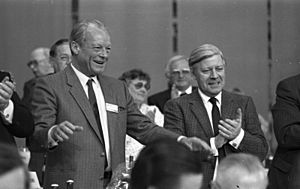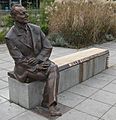Willy Brandt facts for kids
Quick facts for kids
Willy Brandt
|
|
|---|---|
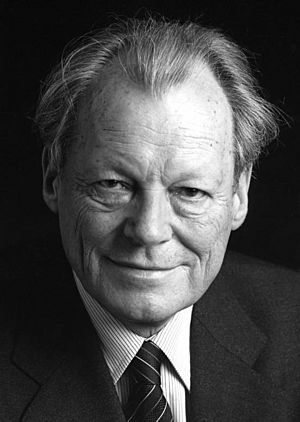
Brandt in 1980
|
|
| Chancellor of Germany | |
| In office 22 October 1969 – 7 May 1974 |
|
| President | Gustav Heinemann |
| Vice-Chancellor | Walter Scheel |
| Preceded by | Kurt Georg Kiesinger |
| Succeeded by |
|
| Leader of the Social Democratic Party | |
| In office 16 February 1964 – 14 June 1987 |
|
| Federal Manager |
|
| Preceded by | Erich Ollenhauer |
| Succeeded by | Hans-Jochen Vogel |
| Vice-Chancellor of Germany | |
| In office 1 December 1966 – 22 October 1969 |
|
| Chancellor | Kurt Georg Kiesinger |
| Preceded by | Hans-Christoph Seebohm |
| Succeeded by | Walter Scheel |
| Minister for Foreign Affairs | |
| In office 1 December 1966 – 20 October 1969 |
|
| Chancellor | Kurt Georg Kiesinger |
| Preceded by | Gerhard Schröder |
| Succeeded by | Walter Scheel |
| Governing Mayor of West Berlin | |
| In office 3 October 1957 – 30 November 1966 |
|
| Mayor |
|
| Preceded by | Otto Suhr |
| Succeeded by | Heinrich Albertz |
| President of the Bundesrat |
|
| In office 1 November 1957 – 31 October 1958 |
|
| First Vice President |
|
| Preceded by | Kurt Sieveking |
| Succeeded by | Wilhelm Kaisen |
| President of the Abgeordnetenhaus of Berlin |
|
| In office 11 January 1955 – 2 October 1957 |
|
| Preceded by | Otto Suhr |
| Succeeded by | Kurt Landsberg |
| Personal details | |
| Born |
Herbert Ernst Karl Frahm
18 December 1913 Lübeck, Free City of Lübeck, German Empire (now Schleswig-Holstein, Germany) |
| Died | 8 October 1992 (aged 78) Unkel, Rhineland-Palatinate, Germany |
| Resting place | Zehlendorf, Berlin |
| Citizenship | Germany (revoked 1938; regained 1948) Norway (from 1940) |
| Political party | Social Democratic Party (1930–1931; from 1948) |
| Other political affiliations |
Socialist Workers' Party (1931–1946) |
| Spouses |
|
| Children | 4, including Matthias |
| Awards | Nobel Peace Prize (1971) |
| Signature | |
Willy Brandt (born Herbert Ernst Karl Frahm; 18 December 1913 – 8 October 1992) was an important German politician. He led the Social Democratic Party of Germany (SPD) from 1964 to 1987. He also served as the Chancellor of West Germany from 1969 to 1974.
Brandt received the Nobel Peace Prize in 1971. This was for his efforts to improve relations between West Germany and countries in Eastern Europe. He was the first Social Democratic Chancellor since 1930.
During the Nazi era, Brandt had to flee Germany. He went to Norway and then Sweden. He worked as a journalist and used the name Willy Brandt to stay safe. He officially adopted this name in 1948. Brandt first became famous as the Governing Mayor of West Berlin. Later, he became the Foreign Minister and Vice-Chancellor. He became Chancellor in 1969.
As Chancellor, he kept West Germany close to the United States. He also worked to strengthen European integration in Western Europe. At the same time, he started a new policy called Ostpolitik. This policy aimed to improve relations with Eastern European countries. Brandt resigned as Chancellor in 1974. This happened after one of his close helpers was found to be a spy for East Germany.
Contents
Early Life and Escape
Willy Brandt was born Herbert Ernst Karl Frahm in Lübeck, Germany, on 18 December 1913. His mother, Martha Frahm, was a single parent who worked as a cashier. His grandfather, Ludwig Frahm, mostly raised him.
In 1929, he joined the "Socialist Youth" group. In 1930, he joined the Social Democratic Party (SPD). He later left the SPD to join a more left-wing group called the Socialist Workers Party (SAP).
In 1933, to escape the Nazis, he left Germany for Norway. This is when he started using the name Willy Brandt. It was a secret name to avoid being caught by Nazi agents. In 1934, he helped start a group called the International Bureau of Revolutionary Youth Organizations.
Brandt visited Germany secretly in 1936. He pretended to be a Norwegian student. In 1937, he worked as a journalist in Spain during the Spanish Civil War. In 1938, Germany took away his citizenship. He then asked for Norwegian citizenship. In 1940, German soldiers arrested him in Norway. But they did not find out his real identity because he wore a Norwegian uniform. After being released, he escaped to neutral Sweden. He became a Norwegian citizen in August 1940. He lived in Sweden until the end of World War II. He learned Norwegian and Swedish while in exile.
In 1946, Brandt returned to Berlin. He worked for the Norwegian government. In 1948, he rejoined the SPD. He also became a German citizen again and officially changed his name to Willy Brandt.
Becoming a Politician
Brandt was elected to the West German Bundestag (federal parliament) in 1949. He represented West Berlin until 1957. He was also a representative in the West Berlin parliament. Later, in 1969, he was again elected to the Bundestag. He stayed in parliament until his death in 1992.
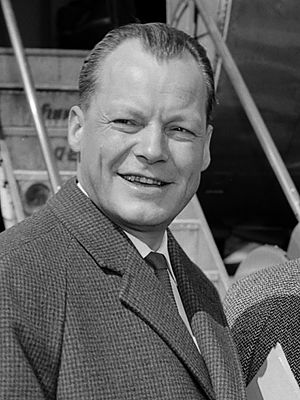
From 1957 to 1966, Willy Brandt was the Governing Mayor of West Berlin. This was a time of growing tension between East and West. This tension led to the building of the Berlin Wall. Brandt spoke out against the Soviet Union's actions. He criticized their control over the 1956 Hungarian Uprising. He also spoke against their idea to make Berlin a "free city" in 1958.
As Mayor of West Berlin, Brandt helped develop the city. Many new buildings were constructed. Important landmarks like Schloss Charlottenburg were restored. New roads were opened, and many new homes were built each year.
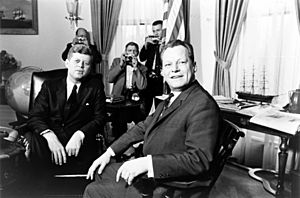
In 1961, U.S. President John F. Kennedy saw Brandt as a future leader of West Germany. Kennedy hoped Brandt would become Chancellor. He showed this by inviting Brandt to the White House before meeting with the current German leader. Kennedy believed Brandt represented Germany's future.
However, after the Berlin Wall was built in August 1961, Brandt was upset with Kennedy. He publicly criticized Kennedy, saying Berlin expected "more than words." Kennedy was angry, but he sent his Vice President, Lyndon B. Johnson, to Berlin to ease the tension. In 1963, Brandt played a big part in Kennedy's famous visit to West Berlin.
Brandt became the leader of the SPD in 1964. He held this position until 1987. He ran for Chancellor in 1961 and 1965 but lost both times. In 1966, the SPD formed a "grand coalition" government with the conservative party. Brandt became the foreign minister and Vice-Chancellor of Germany.
Chancellor of West Germany
In the 1969 elections, the SPD became stronger with Brandt as their main candidate. After three weeks of talks, the SPD formed a government with the smaller Free Democratic Party (FDP). Willy Brandt was then elected Chancellor.
Foreign Policy: Ostpolitik
As Chancellor, Brandt developed his (Neue) Ostpolitik (which means "new eastern policy"). This policy aimed to improve relations with East Germany, the Soviet Union, Poland, and other communist countries.
Brandt started this policy slowly. He began by setting up diplomatic relations with Romania in 1967. He also made a trade agreement with Czechoslovakia. In 1968, he restored relations with Yugoslavia. However, the Soviet invasion of Czechoslovakia in 1968 was a big disappointment. He stopped Ostpolitik for a short time. In 1969, he showed he was ready to meet with East German leaders. He wanted to meet with the USSR and Poland to solve border issues from 1945. He met with the East German premier in 1970.
Brandt suggested a six-point plan. It involved two separate German states that would respect each other's borders. They would work together peacefully. In 1970, he signed a treaty with the Soviet Union. This treaty normalized relations and recognized existing borders. A treaty with Poland in December 1970 accepted the current borders.
During a visit to a memorial for the Warsaw Ghetto Uprising in Poland, Brandt did something unexpected. He suddenly knelt down in silence. This moment, known as the Kniefall von Warschau (Warsaw Genuflection), honored the victims. It was seen as a powerful gesture of apology and reconciliation around the world.
The issue of Berlin was settled in 1971. The most important step was the Basic Treaty with East Germany. This treaty made their relationship official and equal. Both Germanies joined the United Nations in 1973. Brandt was the first German Chancellor to speak at the United Nations General Assembly.
In 1971, Brandt received the Nobel Peace Prize. This was for his work in improving relations with East Germany, Poland, and the Soviet Union. His policies helped bring a long-delayed end to the issues from World War II.
Brandt's Neue Ostpolitik was very controversial in West Germany. Some people, especially those who had been forced to move from Eastern Europe after the war, strongly opposed it. They called it "illegal." Others supported it, believing it would lead to "change through rapprochement" (getting closer). They thought it would help break down the "siege mentality" of the Eastern Bloc. Supporters believe this policy helped lead to the fall of communism in Eastern Europe.
Domestic Policies: Reforms at Home
Brandt's government also brought many social changes to West Germany. He wanted his government to be one that reformed society. Within a few years, the budget for education greatly increased. A large part of the government's spending went to welfare programs.
Brandt aimed to make West Germany a more open society. He focused on improving education, healthcare, housing, and workers' rights.
- Education: The government worked to give more people access to education. They increased the number of teachers. Students received money to help with living costs. Universities became more accessible to many students. The school leaving age was raised to 16.
- Social Welfare: Spending on social programs almost doubled. This included increases in social security benefits. Things like injury and sickness benefits, pensions, and unemployment benefits all went up.
- Healthcare: Measures were taken to improve healthcare. Free hospital care was introduced for many people. Preventative treatments were included in health insurance. Compulsory health insurance was extended to more groups.
- Housing: The government improved the rights of tenants. They also increased financial help for housing. Public housing subsidies increased, and new public housing units were built.
- Civil Rights: Greater legal rights were given to women. The voting age was lowered from 21 to 18. The age for holding political office was also lowered. Corporal punishment was banned in schools.
- Workers' Rights: Laws were introduced to ensure workers continued to be paid if they were sick. Maternity leave was increased. Employers had to provide company doctors and safety experts. Workers' councils were given more power in workplaces.
- Environment: A federal environmental program was started in 1971. Laws were passed to control garbage and air pollution.
Brandt's reforms made him popular with many young West Germans. They wanted a more open and modern country. His famous words were, "Wir wollen mehr Demokratie wagen" (meaning: "Let's dare more democracy").
The 1972 Crisis
Brandt's Ostpolitik caused problems for his government. Some members of parliament disagreed with his policies. In 1972, some members left his coalition. This meant Brandt lost his majority in parliament.
On 24 April 1972, a vote was held to try and remove Brandt as Chancellor. Everyone expected him to lose. But surprisingly, the vote failed. Brandt remained Chancellor, but his government was weakened.
New Elections and Resignation
Because of the political problems, new elections were called. In the 1972 election, many artists and intellectuals supported Brandt and the SPD. Brandt's Ostpolitik and his reforms were popular with younger people. The SPD achieved its best election result ever that year.
However, Brandt's time in government began to decline. Many of his reforms faced resistance. The 1973 oil crisis and a major public services strike also caused problems. Brandt was seen more as a visionary than a manager. He also struggled with depression. To show he was not soft on communists, Brandt introduced strict laws. These laws prevented "radicals" from working in public service.
The Guillaume Affair
Around 1973, West German security groups learned that one of Brandt's personal assistants, Günter Guillaume, was a spy for East Germany. Brandt was asked to continue working as usual, and he agreed. He even went on a private vacation with Guillaume.
Guillaume was arrested on 24 April 1974. Many people blamed Brandt for having a spy so close to him. Brandt resigned as Chancellor on 6 May 1974. He continued to be a member of parliament and the leader of the Social Democrats until 1987.
The spy scandal was seen as the reason for Brandt's resignation. However, some believe it was just the final push, not the main cause. Guillaume was an agent for the East German secret service. After Germany was reunified, the head of the East German intelligence service said that they never intended for Brandt to resign. He called it one of their biggest mistakes.
Helmut Schmidt, another Social Democrat, became Chancellor after Brandt.
After Being Chancellor
After leaving the Chancellor's office, Brandt remained a member of the Bundestag. He also stayed as the Chairman of the Social Democratic Party until 1987. After that, he became the party's Honorary Chairman. Brandt was also a member of the European Parliament from 1979 to 1983.
Socialist International
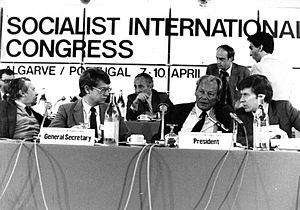
For sixteen years, Brandt was the president of the Socialist International (1976–1992). This group brings together socialist and social democratic parties from around the world. During his time, the number of member parties grew to over a hundred.
Under Brandt's leadership, the Socialist International worked on many global issues. This included the Cold War and the arms race. They also tried to help resolve conflicts in the Middle East and Central America.
The Brandt Report
In 1977, Brandt became the head of a special group called the Independent Commission for International Developmental Issues. This group published a report in 1980. The report called for big changes in how the world dealt with development in poorer countries. This report became known as the Brandt Report.
German Reunification
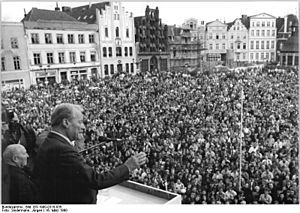
In late 1989, Brandt was one of the first left-wing leaders in West Germany to publicly support a quick reunification of Germany. He did not want a two-state federation or other temporary arrangements. Brandt's famous statement, "Now grows together what belongs together," was widely quoted at the time.
Helping Hostages in Iraq
One of Brandt's last public actions was flying to Baghdad, Iraq, in 1990. He went to free Western hostages held by Saddam Hussein after Iraq invaded Kuwait. Brandt successfully helped release many hostages. On 9 November 1990, his plane landed in Frankfurt with 174 freed hostages.
Death and Legacy
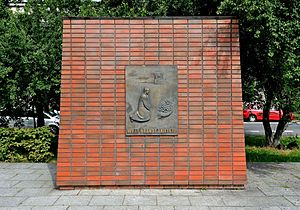
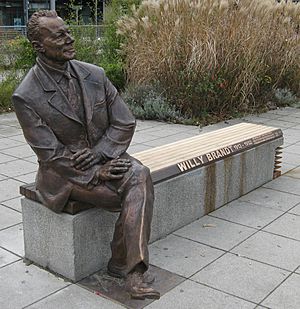
Willy Brandt died from cancer at his home in Unkel, Germany, on 8 October 1992. He was 78 years old. He received a state funeral and was buried in Berlin.
The Federal Chancellor Willy Brandt Foundation was created in 1994. It honors Brandt's political achievements and his dedication to peace, freedom, and democracy. The foundation has two permanent exhibitions, one in Berlin and one in Lübeck, his birthplace.
In 1997, a park in Stockholm, Sweden, was named after Brandt. It is near where he lived during his time in exile. The SPD's headquarters in Berlin is called the "Willy Brandt Haus." One of the buildings of the European Parliament in Brussels was also named after him in 2008.
On 6 December 2000, a memorial to Brandt and his "Warsaw Genuflection" was unveiled in Warsaw, Poland. In 2009, a Willy Brandt Memorial was opened in Nuremberg. The University of Erfurt renamed its public administration school the Willy Brandt School of Public Policy. A private German school in Warsaw is also named after him.
Willy Brandt is remembered as one of the most popular politicians in the history of West Germany. Berlin Brandenburg Airport, which opened in 2020, is also named in his honor.
Brandt's Family
Willy Brandt was married three times. His first marriage was to Anna Carlotta Thorkildsen from 1941 to 1948. They had one daughter, Ninja Brandt.
In 1948, Brandt married Rut Hansen. They had three sons: Peter (born 1948), Lars (born 1951), and Matthias Brandt (born 1961). Willy and Rut divorced in 1980.
In 1983, Brandt married Brigitte Seebacher.
Images for kids
See also
 In Spanish: Willy Brandt para niños
In Spanish: Willy Brandt para niños
 | Selma Burke |
 | Pauline Powell Burns |
 | Frederick J. Brown |
 | Robert Blackburn |


